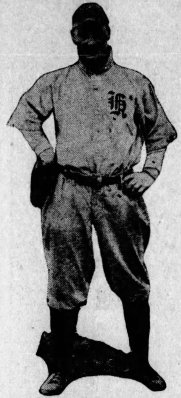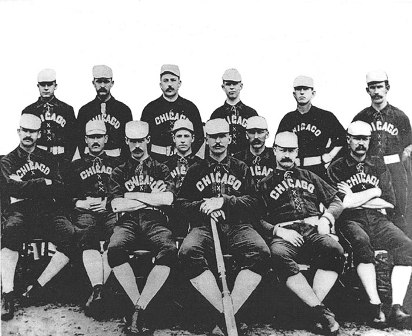The Science of Survival
Brian Bell was a sports columnist for The Associated Press before eventually becoming Chief of their Washington D.C. bureau.
In 1931 he related a story:
“(I)t was a dangerous strategy to play close in with (Napoleon) Lajoie at bat. Once when Cleveland was playing in Detroit. (Bill) Coughlin, the Tigers Third sacker, played in close with Bill Bradley up, for the Cleveland third sacker was adept at dragging bunts. Then when Lajoie came up, Coughlin retreated to a position well beyond third base for Nap could hit balls down the third base line as though the ball had been fired from a rifle.
“The fans razzed Coughlin, yelling questions at to him to whether there was any lack of courage in getting out of range of one of the big fellow’s bullet-like hits. Finally, Bill walked over to the foul line and help up his hand for silence. He got it.
‘”Ladies and gentlemen.’ He said, ‘I wish to make an announcement. This is a game of science and skill, not bravery.’”

Bill Coughlin
Jennings on Kauff
Benny Kauff was on his way to hitting .308 for the New York Giants in 1917, Hughie Jennings, the manager of the Detroit Tigers, told the Newspaper Enterprise Association was not impressed:

Benny Kauff
“(He) says Benny Kauff would bat about .250 if in the American League.
“’Kauff was a wise boy when he elected to go with the Giants,’ says Hughie. There are a dozen, or more, outfielders in the American League who are far superior to him. I could name any Detroit outfielder, two on the Chicago club, two with Cleveland, one with St. Louis, one with Philadelphia, one with Washington, three with Boston, and two with New York who are superior to him.’
“’Kauff is not a good hitter. He is a fellow who stands up at the plate and slams away at the ball. A wise pitcher would have him in the hole all the time. The pitching in the American League is admitted to be much better than that served in the National; the fielding is also better.’”
Bill Klem’s All-Time All-Stars
Bill Klem had been a National League umpire since 1905 and had worked 17 World Series by 1939—he would work his final World Series in 1940.
The New York Daily News asked him that year to name his all-time all-star team—most interesting in where it varies from other such teams named by “experts” during that period. The paper said:
“Bill still insists he never made a mistake, so this team must be right.”
Pitchers:
Carl Hubbell
Grover Cleveland Alexander
Walter Johnson
Mordecai Brown
Christy Mathewson
Catchers
Roger Bresnahan
Wilbert Robinson
Johnny Kling
Gabby Hartnett
First Base
Hal Chase
Second Base
Frankie Frisch
Third Base
Jimmy Collins
Shortstop
Honus Wagner
Utility Infielders
Eddie Collins
Bill Terry
Harry Steinfeldt
Outfield
Ty Cobb
Ginger Beaumont
Babe Ruth
Utility outfielders
Tris Speaker
Fred Clarke


Leave a comment